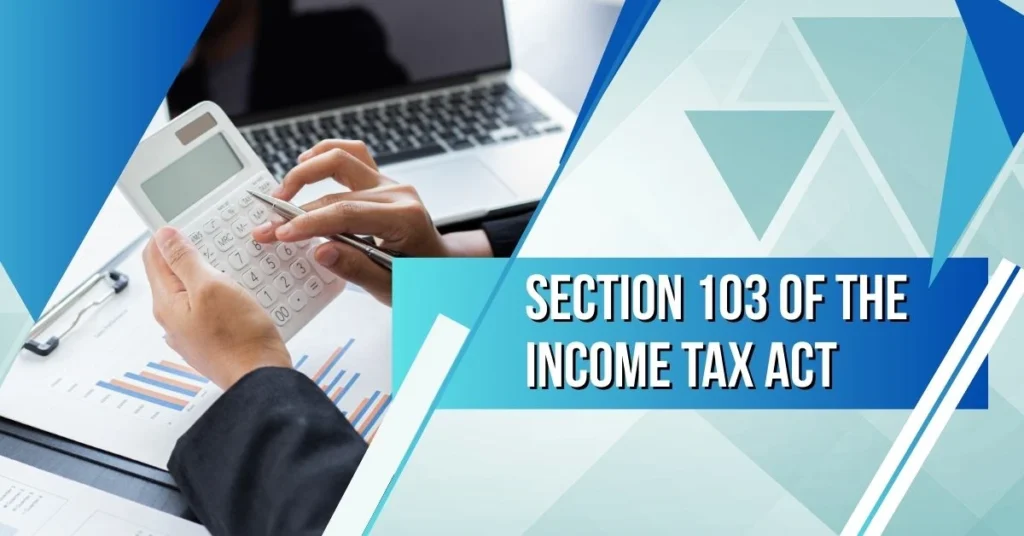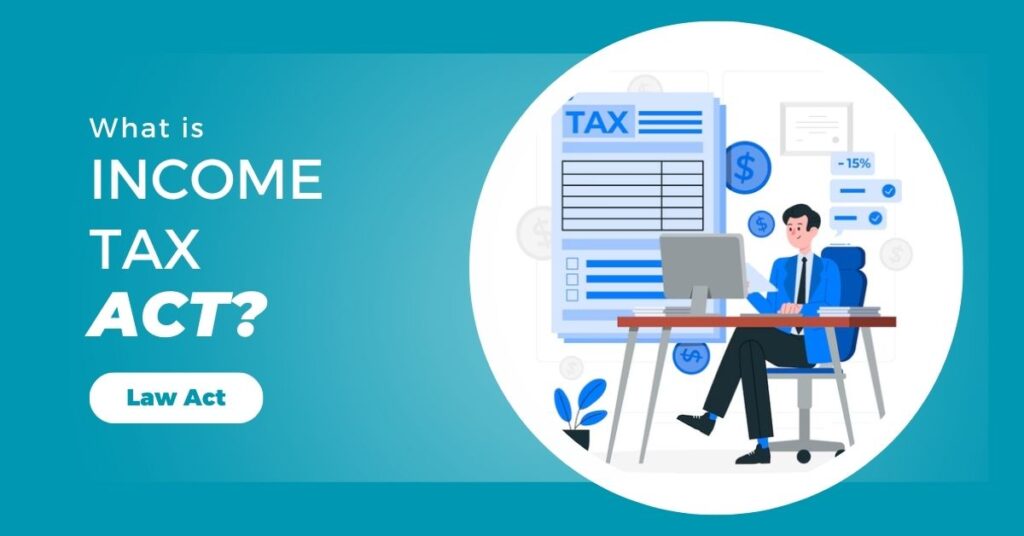Section 103 of the Income Tax Act deals with the definitions of key terms that are used throughout the Income Tax Act. It explains what different tax-related words and phrases actually mean. Without these definitions, it would be difficult to understand other sections of the Act because tax laws rely on precise meanings. It provides clear explanations of different terms like “business,” “capital asset,” “dividend,” “income,” and many others. For taxpayers, accountants, and businesses, knowing the meaning of these terms is very important, because even a small misunderstanding can lead to wrong tax filing or disputes with the income tax department.
Why Section 103 is Important
Section 103 is not just a part of the law—it is the foundation for interpretation. Every tax rule is based on the terms explained in this section. If someone does not understand the meaning of a term under Section 103, they may misapply the law. For example, if a person does not know what counts as a “capital asset,” they may wrongly report their income from the sale of property.
Another reason this section is important is that the definitions given here override normal dictionary meanings. In legal terms, the definitions in Section 103 are considered final for the Income Tax Act. This ensures uniformity, so everyone follows the same meaning while dealing with tax matters.
Key Terms Defined in Section 103
To make Section 103 easier to understand, here are some of the important terms explained under it:
| Term | Meaning under Section 103 |
|---|---|
| Business | Includes any trade, commerce, or manufacturing activity carried out with the intention of earning profits. |
| Capital Asset | Refers to property of any kind, whether movable or immovable, tangible or intangible, except a few exclusions like stock-in-trade. |
| Dividend | Distribution of profits by a company to its shareholders, whether in cash or any other form. |
| Income | Includes salaries, profits, gains from business, property income, capital gains, and other sources. |
| Assessing Officer | The income tax officer who has the power to assess or examine tax returns. |
| Person | Includes an individual, a Hindu Undivided Family (HUF), a company, a partnership firm, an association of persons (AOP), or even a body of individuals. |
| Previous Year | The financial year in which income is earned before it is assessed in the next year. |
| Assessment Year | The year in which income of the previous year is assessed and taxed. |
This table makes it easier to quickly understand some of the main terms under Section 103. Each of these terms has a wide scope and plays an important role in taxation.
Section 103 and Its Role in Income Tax Compliance
For individuals and businesses, compliance with tax laws means filing tax returns correctly and paying taxes on time. Section 103 ensures that taxpayers know exactly what counts as income, business profits, or capital gains. This helps them calculate their taxes in the right way.
For example, if a person sells a piece of land, they need to know whether that land is a “capital asset” under Section 103. If it is, the profit from its sale will be taxed as capital gains. If it is not, then it may fall under another head of income.
Similarly, companies need to know the correct meaning of “dividend” to report distributions properly. Misreporting can lead to penalties and legal issues.
Section 103 vs. Normal Dictionary Meanings
One of the most confusing parts of tax law is that the meanings under Section 103 are not always the same as everyday dictionary meanings. For example, in daily life, “income” may mean only salary or money received. But under Section 103, “income” includes not just salary, but also business profits, capital gains, house property income, and other sources.
This difference is very important for taxpayers. If someone only considers income as salary and ignores capital gains, they may end up underreporting their income and facing penalties. Section 103 avoids such confusion by giving precise definitions.
Practical Example of Section 103 in Action
Let’s take an example to understand better:
Suppose Mr. Raj sells his ancestral property and earns a profit. He wonders whether this profit is taxable. By looking at Section 103, he understands that capital asset includes property, and the profit earned is capital gains, which are taxable. Without this definition, he might think the profit is just personal income and not taxable.
This simple example shows how Section 103 guides taxpayers in applying tax rules correctly.
Importance of Section 103 for Businesses
Businesses have to deal with many tax terms every day. Whether it is filing returns, paying advance tax, or handling audits, Section 103 provides the legal base. Some ways businesses use Section 103 are:
- To know whether their activities are covered under “business” or not.
- To understand whether a distribution to partners or shareholders qualifies as income or dividend.
- To check whether their assets are considered capital assets or business assets.
- To ensure compliance while filing tax returns and financial reports.
By relying on Section 103, businesses can reduce disputes with tax authorities and maintain smooth operations.
Section 103 and Legal Disputes
Many tax-related court cases are based on the interpretation of terms in Section 103. When there is a dispute between a taxpayer and the income tax department, the courts often refer to the definitions under Section 103 to resolve the issue.
For example, if there is a disagreement about whether a certain receipt is “income,” the court will look at how Section 103 defines income, rather than relying on the dictionary meaning. This shows that Section 103 is not just theoretical but also practical in resolving legal matters.
Section 103 for Students and Professionals
For students of law, commerce, and accounting, Section 103 is one of the most basic yet important topics. It forms the base for studying other provisions of the Income Tax Act. Professionals like chartered accountants, tax consultants, and company secretaries also use this section daily in their work.
By learning Section 103 thoroughly, students and professionals can build a strong foundation in taxation. It also helps them provide correct guidance to clients or employers in real-life situations.
Conclusion: Why Every Taxpayer Should Know Section 103
Section 103 of the Income Tax Act may look like just a list of definitions, but it is the backbone of the entire law. Without it, taxpayers, businesses, and professionals would find it very difficult to understand and apply other sections.
By knowing the meanings of terms like income, business, capital asset, and dividend, taxpayers can ensure accurate tax filings and avoid penalties. Businesses can use these definitions to handle compliance and audits smoothly. Even courts depend on this section to settle tax disputes.ons.
Also Read:
- Section 102 of the Income Tax Act
- Section 101 of the Income Tax Act
- Section 100 of the Income Tax Act
- Section 10 of the Income Tax Act
- Section 1 of the Income Tax Act
Frequently Asked Questions
What terms are covered under Section 103?
Section 103 covers many terms like income, capital asset, business, dividend, assessment year, previous year, person, and assessing officer. These terms are used in other sections of the Income Tax Act. Understanding them is essential because they decide how taxes are calculated and which rules apply.
Does Section 103 replace dictionary meanings?
Yes, Section 103 replaces normal dictionary meanings for tax purposes. The meanings given in this section are legally binding under the Income Tax Act. For example, income in daily life may mean salary only, but in Section 103 it also includes profits, capital gains, and other sources.
How does Section 103 affect businesses?
For businesses, Section 103 is very important. It explains whether their activities count as business, what counts as capital assets, and how dividends are treated. By following these definitions, businesses can file accurate tax returns, avoid penalties, and stay compliant with Indian tax laws without confusion.
Can Section 103 help in legal disputes?
Yes, Section 103 is often used in legal disputes between taxpayers and the tax department. Courts refer to the definitions in Section 103 to settle disagreements. For example, if there is a question about whether something is taxable income, the court relies on this section for clarification.
Who should study Section 103 carefully?
Everyone who deals with taxes should study Section 103, including individuals, businesses, accountants, and tax consultants. Students of commerce and law also need to learn it because it forms the base of taxation studies. Knowing Section 103 helps in applying other tax rules correctly and confidently.
What is the meaning of income under Section 103?
Under Section 103, income means much more than just salary. It includes salary, profits from business, income from house property, capital gains, and income from other sources. This wider definition ensures that all earnings are covered under tax law and people cannot avoid tax by misinterpretation.
What is the role of capital asset in Section 103?
Capital asset is a key term under Section 103. It includes property of any kind, whether movable or immovable, but excludes items like stock-in-trade. Knowing whether something is a capital asset is important because profit from its sale is taxed as capital gains under income tax law.
How does Section 103 help in tax filing?
Section 103 helps taxpayers by giving clear meanings of terms used in the tax return forms. For example, it explains income, previous year, and assessment year. With this clarity, taxpayers can calculate their taxable income correctly, claim the right exemptions, and file accurate tax returns every year.



